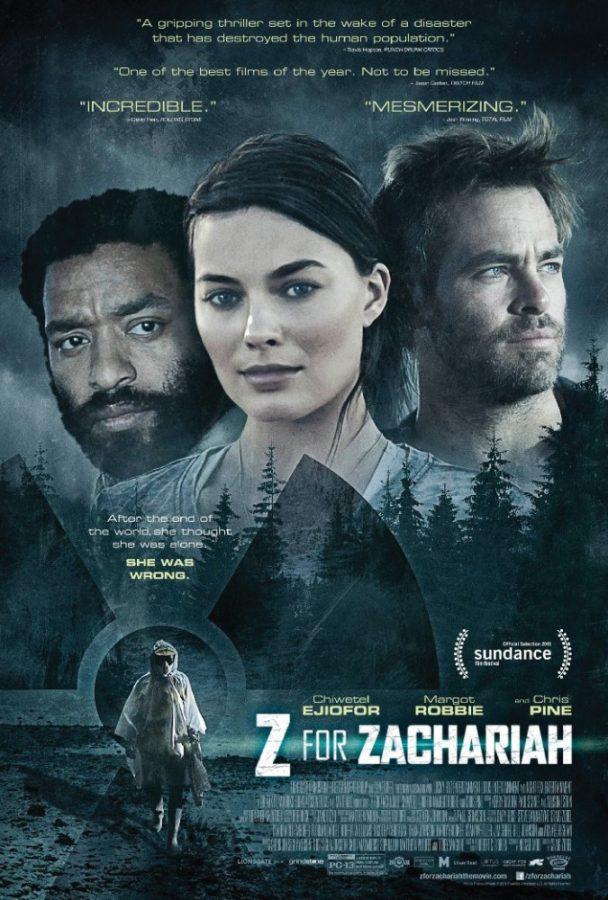“Z for Zachariah” is a love-triangle-centric Biblical allegory that is quiet, from the remarkable performances of its three-person ensemble to its picturesque setting.
Nuclear armageddon has happened, but a small piece of land has avoided the fallout. Ann Burden (Margot Robbie) lives on this modest plot where there’s the family farmhouse, the farm, the fields she tends to, a gas station and, most importantly, a wooden church that her father built with his own hands. It’s a simple, earthly hamlet, standing as an allegorical Garden of Eden.
Ann is salt-of-the-earth self-sufficient, relying on only her dog and her religion for companionship and fortitude. However, when she’s innocuously shown lying in bed, looking listlessly at nothing, it’s apparent that not even the bedrocks of God and man’s best friend are enough to combat the boredom, and ultimately, hopelessness of the apocalypse.
Robbie plays Ann as she should be played, with earnestness and good-heartedness that is never ironic. There’s a lot of complexity within the simplicity.
However, a man appears to shake up the monotonous tranquility. John Loomis (Chiwetel Ejiofor) has traveled far and wide to find a place devoid of fallout. He arrives in a bulky, impressive contamination suit, and this is the first sign that John has more of a mind for science.
In fact, he’s hardly religious at all. He and Ann must learn to co-exist together. Thankfully, they are both respectful people. John may look curiously at Ann as she bows her head to pray before any meal, but he doesn’t consider her a simpleton. Ejiofor brings an inherent dignity to his characters. Ann, on the other hand, never prods John about the lack of God in his life.
The allegorical language is not hidden. John and Ann are the only remaining man and woman, making them Adam and Eve.
John wants to harness the power of a nearby waterfall to power a broken generator. He wants to build a water wheel, but the only option for wood would be to tear down Ann’s chapel. So, in order to build a Wheel and make Progress, Religion would have to be sacrificed.
Yes, sometimes it does feel like the concepts are in capital letters.
But the thing about lofty, larger-than-life concepts is that they are at the mercy of imperfect human nature. When John brings up the idea of potentially repopulating the Earth, you get the idea that part of it stems from a noble notion. It’s also no coincidence that the night before he caught a glimpse of Ann’s bare thigh, and he sure would like to see that thigh again.
Director Craig Zobel, who also co-founded the website Homestar Runner, has an eye for characters’ fleeting glances.
Another interloper, Caleb (Chris Pine), will offset the dynamic between John and Ann. From the very first shot we see Caleb, a dirty face adorned with an opaque five o’clock shadow and uncannily clear eyes, we know that this is our snake, come to tempt.
The effect is immediate. With John acting prudently and refusing to act on the mutual lust between him and Ann, she finds an outlet for flirtation with Caleb. It’s innocent, with giggles and jokes. All the while, John sneaks quick looks. John’s the “nice guy” who couldn’t close, and now Caleb’s the “jock” who’s slid in to steal his girl. Sometimes, the Garden of Eden has the same social dynamics as high school.
Caleb is successful; the church comes down to create the water wheel, but Caleb has the ultimate victory in bedding Ann. In a scene that emanates seedy passion from a wash of orange light, Ann gives into temptation.
Yet, in the end, Ann has a much better outcome than Eve. She is not cast out of Eden, and she doesn’t become the fall girl for the rest of humanity’s sin until the end of time. She partook in the forbidden fruit, and her church is no longer standing, but when John looks upon her as she sits at her organ, playing a hymn of resolution and sorrow, she looks as devout, and beautiful, as ever.
B+
Follow Alex Guyton on Twitter.









